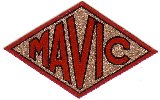# Rings Designed For  | Double | Outer Plate Markings | Premier Ofmega |
| Inner Plate Markings | | Clamp Markings | ~Ofmega |
| Inner Clamp Markings | | Design Category | Parallelogram |
| Pivot Arm Markings | ~Ofmega | Plate Material | Steel |
| Clamp Style | 28.6mm Clamp; Braze-on Tab | Cable Attachment Bolt | 8mm Wrench |
CableStop  | No | Clamp Bolt Type | 8mm Wrench |
Max Ring Difference  | | | |
| Component Groups |
| Primary Group Name | Brand | Quick Info | Browse Group Components |
| Premier | Ofmega | Road Race | View 4 Components |
Details: The Premier groupset contained some of the very best of what Ofmega could do. Some people would argue that the Premier group beats even the innovative Mistral groupset to Ofmega's top spot.
The rear derailleur, which came in two colour forms, is a work of art. The colour forms are those with polished aluminium throughout or those with slate grey knuckles. The design does draw some influences from the Shimano Crane but the lines and smoothness of the design is uniquely Ofmega. The front derailleur looks light and modern. It, too, comes in the same two colour forms. Some gearsets came with Ernesto Colnago's signature pantographed onto them.
The crankset follows the CX and Competizione sets but has no fluting. It retains the classic look of a Campagnolo Nuovo Record clone.
The build quality of all of the components is very high, with some authors stating that, at the time, even Campagnolo couldn't match it.
|
Ofmega SpA was an Italian motorbike and bicycle components company producing high quality components in a variety of ranges: including Master, Mistral (for both road and track), Mundial (a cheaper, slightly later version of Mistral), Competizione, Super Competizione, Linea, Premier, Gran Premio and CX for the road and Sierra for mountain bikes. There were probably more, including at least one other pista/track range. They also produced children's cranksets, individual chainrings and other small components.
The company had a reputation of making slightly (or really) innovative products that were made to a very high quality. Their Mistral dérailleur range, made from a high density, strong plastic, were considered to be amongst the lightest on the market and, certainly, the most colourful. The Mistral range included five (possibly more) colour-coordinated groupsets (both front and rear dérailleurs and "Sintesi" pedals); Pink ("Maglia Rosa" - "Pink Jersey"), Yellow ("Maillot Jaune" - "Yellow Jersey") and Blue ("Squadra Azzura" - "Blue Team" after the Italian national team), Black and Whitest/grey (it would be nice to think that this was the "Milk Race" but probably not). There may have been a green variety but this may just be someone seeing a blue item that had been bleached out in strong sunlight - apparently the blue form was prone to bleaching. A cheaper version of the Mistral rear dérailleurs were produced as the "Mundial" range (with an aluminium jockey-wheel cage and no adjustable barrel spring) but only in black.
The Mistral range was not their only colourfull offering. From the mid-1990s Ofmega started to produce the Sierra range, which was mostly appalling. However, there was a spin-off groupo called Sirio. Sirio cranks came in at least two colours, bright pink and acidic green, whereas, the Sierra range came mostly in black, grey and white. It was these groups that had their production moved in Slovakia in 2000. In addition, the Competizione groupset came anodised in red, blue or gold, as well as plain aluminium: The anodised components included hubs, chainrings and pedals.
Ofmega made or rebranded components for other bicycle brands, such as Bianchi, Colnago, Legnano, Regina and Avocet. At one point, most of the Avocet component range was made by Ofmega. Often, the rebranding is just an added pantographed logo (in the Colnago case, it is the singature of Ernasto Colnago). However, in the case of Legnano branded components, the logo is engraved into the item. It may be that some items were made by other companies, such as the Simplex, in the late 1980s and 1990s. It is thought that the gear shifters for the "Mistral" range were made by Modolo; the cronos shifters look very similar. However, on close inspection, the two aren't that similar and Ofmega claim to have made them themselves.
They made most of the sets, including hubs, cranks, headsets, freewheels, front and rear dérailleurs, as well as odd small parts. Ofmega appeared to have outsourced their dérailleur production to Simplex in 1987 (Michael Sweatman, Disraeli Gears), and some Simplex derailleurs were labelled Ofmega. This lead to an apparent lowering in quality. However, some of their latest items were of a very good standard.
Ofmega missing groups (a list of groupsets not yet represented on Velobase): Strada (may be the same as Competizione or Master), Nuovo Competizione, Vega, Acero, Motion, Rover, Sierra, Lusso, BMX, Nuovo Mistral, Vantage 2 (some of these may be after the period). The "BMX" kit that Ofmega made in the period are smaller "Mundial" pieces. The carbon mountain bike cranks and the glorious "Nuovo Mistral" carbon cranks were the last things that Ofmega took to bike trade shows.
